Module 4 Healthy food Unit 1课件+嵌入音视频共38张PPT)
文档属性
| 名称 | Module 4 Healthy food Unit 1课件+嵌入音视频共38张PPT) |
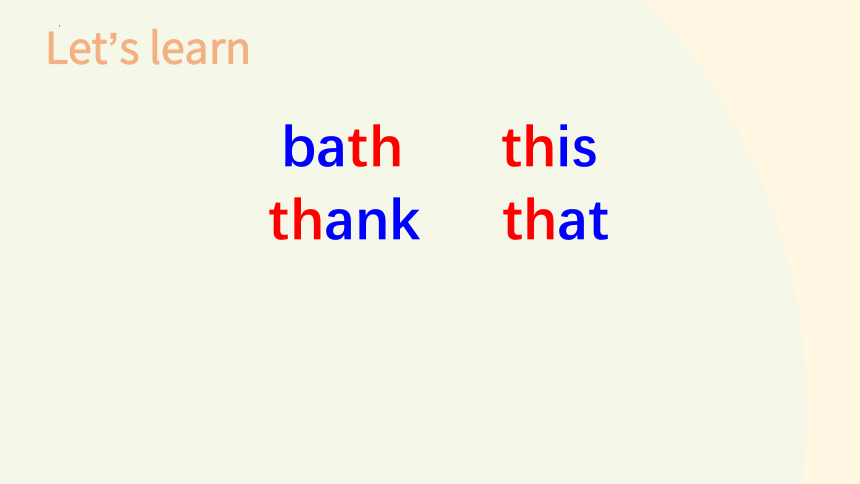
|
|
| 格式 | zip | ||
| 文件大小 | 46.4MB | ||
| 资源类型 | 教案 | ||
| 版本资源 | 外研版 | ||
| 科目 | 英语 | ||
| 更新时间 | 2022-09-18 19:38:45 | ||
图片预览

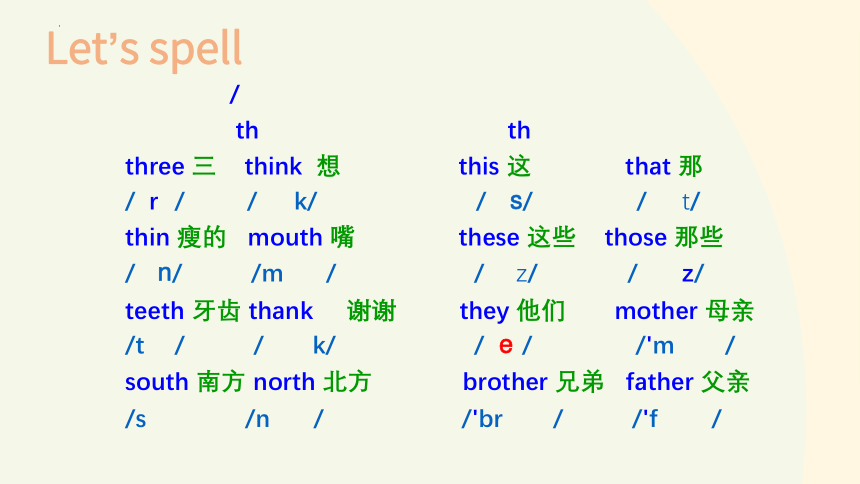
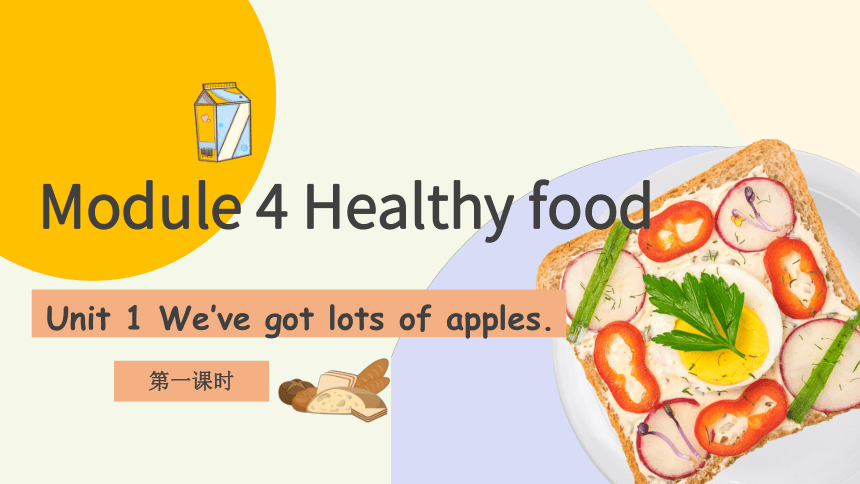
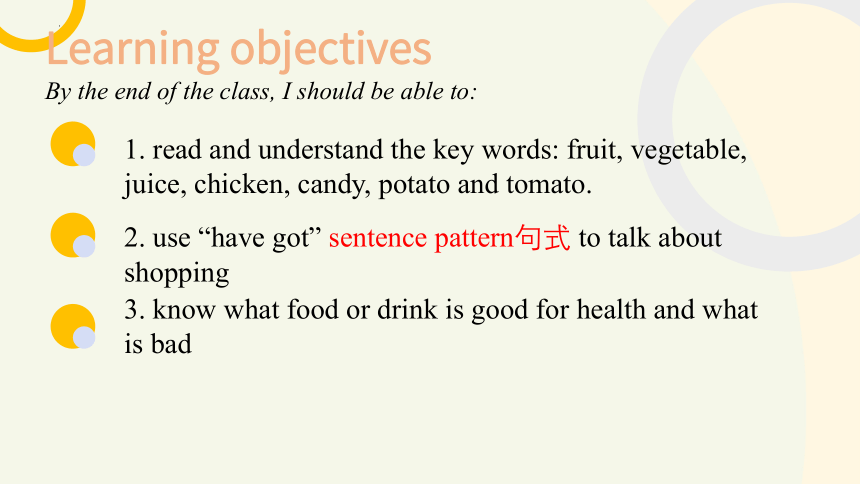
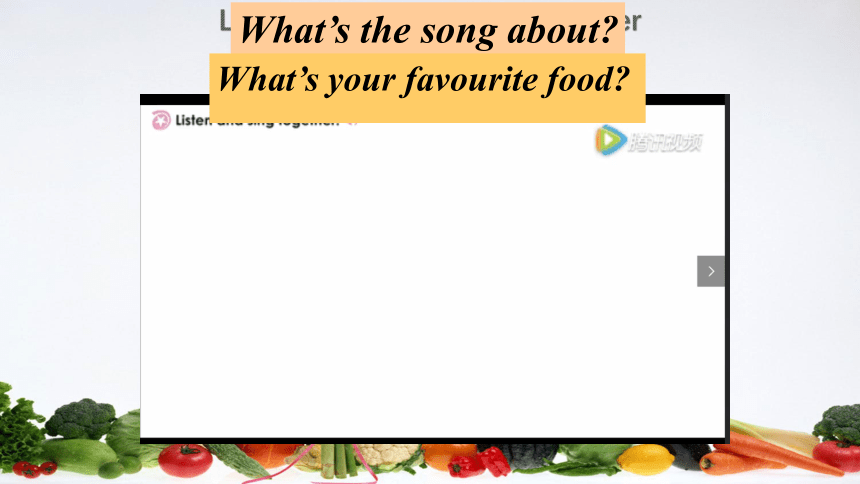
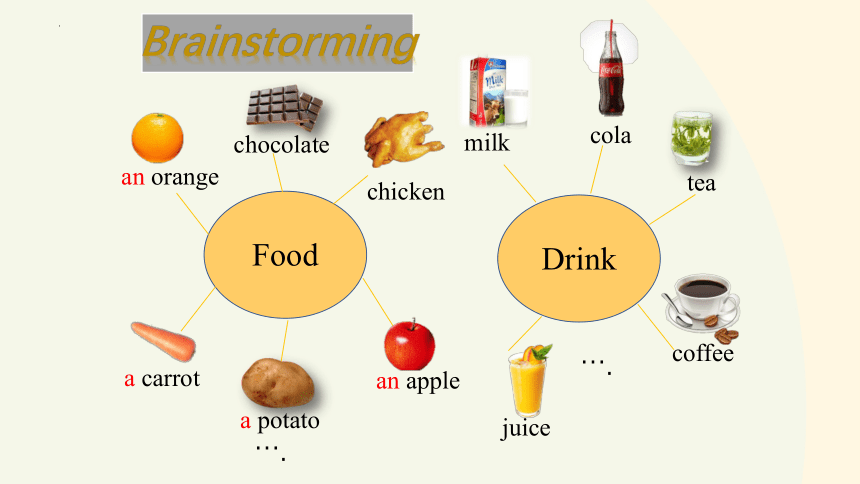
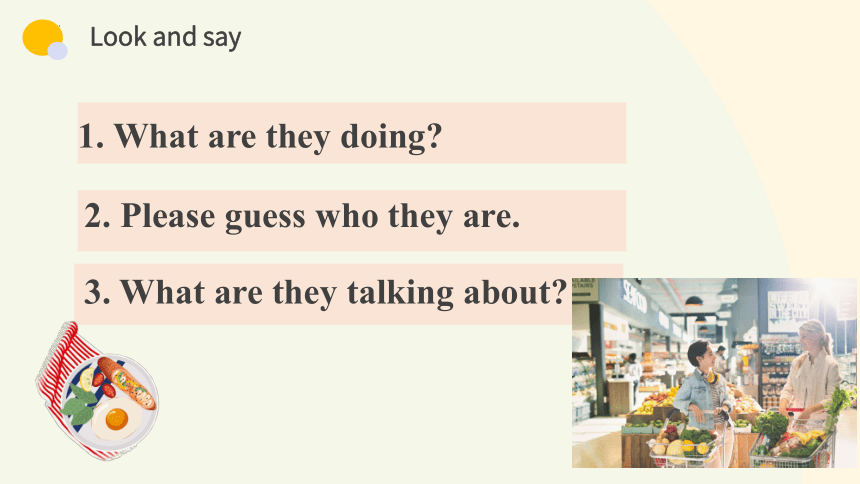

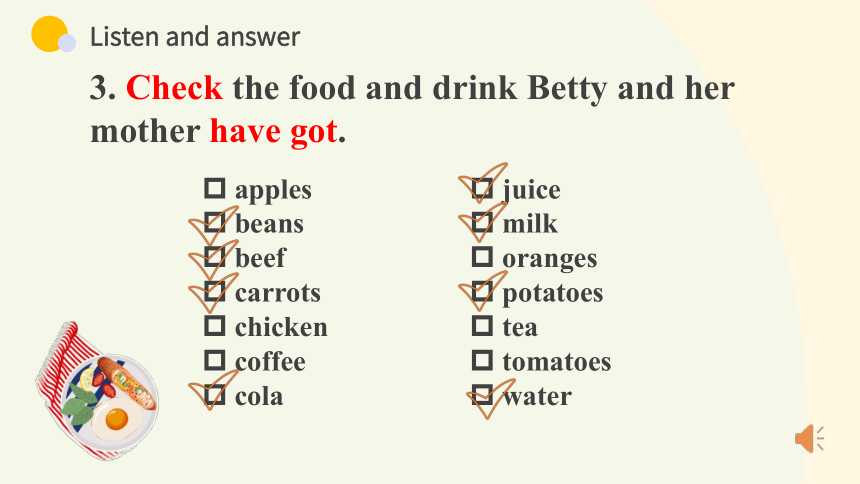
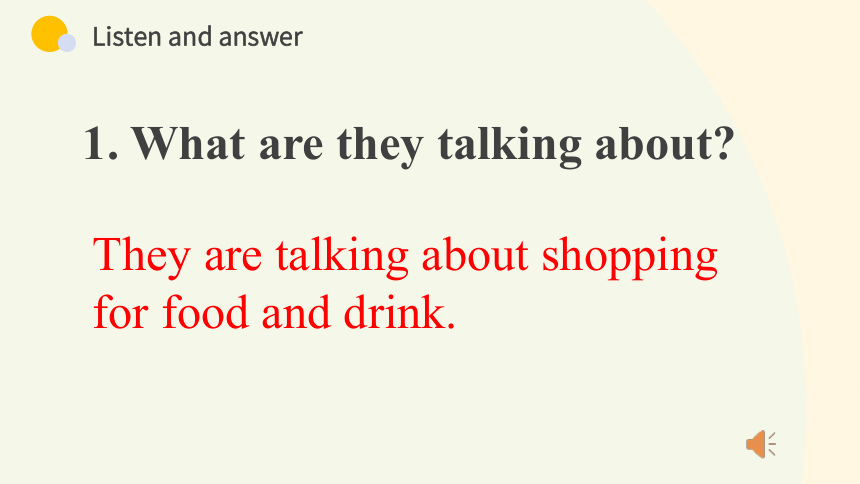
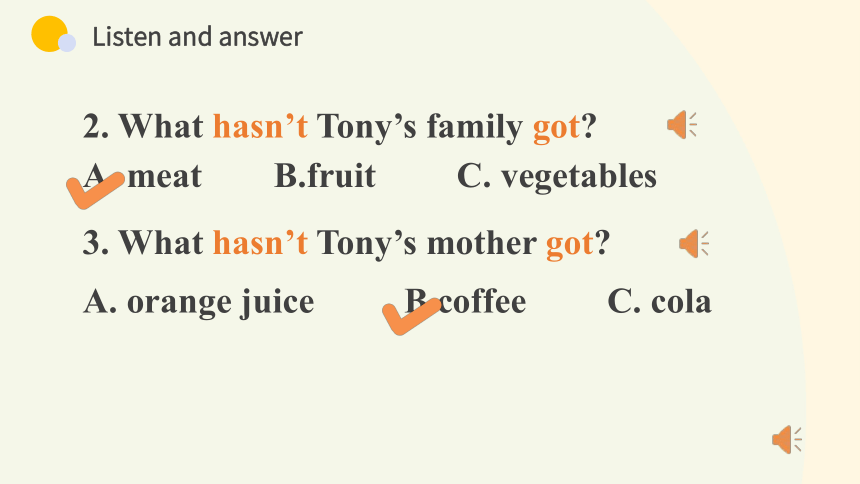
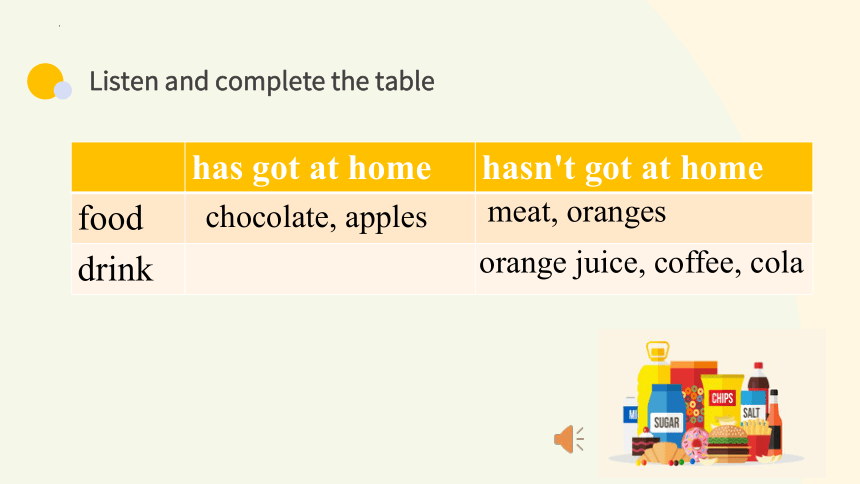
文档简介
(共38张PPT)
bath this
thank that
/
Let’s learn
Let’s spell
/
th th
three 三 think 想 this 这 that 那
/ r / / k/ / s/ / t/
thin 瘦的 mouth 嘴 these 这些 those 那些
/ n/ /m / / z/ / z/
teeth 牙齿 thank 谢谢 they 他们 mother 母亲
/t / / k/ / e / /'m /
south 南方 north 北方 brother 兄弟 father 父亲
/s /n / /'br / /'f /
Module 4 Healthy food
Unit 1 We’ve got lots of apples.
第一课时
Learning objectives
By the end of the class, I should be able to:
1. read and understand the key words: fruit, vegetable, juice, chicken, candy, potato and tomato.
2. use “have got” sentence pattern句式 to talk about shopping
3. know what food or drink is good for health and what is bad
Let’s listen to a song and answer
the questions:
What’s the song about
What’s your favourite food
Brainstorming
Food
Drink
….
….
an orange
chicken
chocolate
a carrot
a potato
an apple
milk
tea
cola
coffee
juice
Look and say
2. Please guess who they are.
1. What are they doing
3. What are they talking about
Listen and answer
2. What are they talking about
1. Who are they
Betty and her mother.
They are talking about their shopping list.
Listen and answer
3. Check the food and drink Betty and her mother have got.
apples
beans
beef
carrots
chicken
coffee
cola
juice
milk
oranges
potatoes
tea
tomatoes
water
Listen and answer
1. What are they talking about
They are talking about shopping for food and drink.
Listen and answer
2. What hasn’t Tony’s family got
3. What hasn’t Tony’s mother got
A. meat B.fruit C. vegetables
A. orange juice B.coffee C. cola
has got at home hasn't got at home
food
drink
meat, oranges
chocolate, apples
orange juice, coffee, cola
Listen and complete the table
Read and imitate 模仿
Does Tony's father agree to get any cola Why
Homework
1.作业本A P32-33
ship usually
/
Let’s learn
Let’s spell
/
sh s
fish wish treasure usually
/f / 鱼 /w / 希望 /‘tre / 宝藏 /’j l / 通常
dish sheep telivision measure
/d / 盘子 / p/ 绵羊 /‘tel ,v n/电视 /’me / 测量
shop she
/F p/ 商店 /Fi:/ 她
wash ship
/w F/ 洗 /FIp/ 轮船
short shout
/F t/ 短的 /F t/ 喊叫
Module 4 Healthy food
Unit 1 We’ve got lots of apples.
第二课时
Ask and answer
What food or drink is bad for your health
What food or drink is good for your health
opposites
反义词
too much chocolate
hamburger
hot dog
ice cream
chips
cakes
fried chicken
pizza
milky tea
junk food垃圾食品/
fast food
tomato
apple
carrot
orange
meat
milk
egg
water
tea
fruit, meat, vegetables, juice
instant noodles方便面
Underline all the sentences with “have got”
Can you summarize the rule of “have got”
Language point 1
have/has got 意为“有,具有”,意义等同于have, 指的是某人有某物
have/has为助动词,否定句在have/has后加not,疑问句把have/has提到句首
e.g.
I have got a Chinese book. 我有一本语文书。
Paul has got two brothers. 保罗有两个兄弟。
I have got plenty of work to do. 我有很多工作要做。
=I have a Chinese book.
Paul has two brothers.
I have plenty of work to do.
Language point 1
We have got some food for breakfast.
We haven't got any food for breakfast.
Have we got any food for breakfast
变为否定句
变为一般疑问
Yes, we have./No, we haven't.
What have we got
划线部分提问
Language point 1
辨析 have got 和 there be
have got 意为某人有某物,there be意为某地有某物、人
1.____ you ____ any brothers or sisters
2. _____________ two hospitals in our city.
3. -_________ any milk in the bottle
-Yes, _________.
Have got
There are
Is there
there is
Ask and answer
Has she got an apple
Yes, she has./ No, she hasn't.
Has she got any potatoes
Has she got any beans
Has she got any coffee
Work in pairs
-I have got a/an/some...in my fridge. But I haven't got any... What about you
-I have ... haven't...
What have you got in your fridge Share with your deskmate.
Work in pairs
-Let's go shopping for food and drink. What have we got for dinner
-We have got some meat, but we haven't got any fish.
- Have we got any oranges
- No, we haven't.
- Have we ...
-Yes,...
...
- How about some milk
- Good idea! Let's get some...
This is your fridge. Talk with your partner and make a shopping list for dinner.
Language point 2
Too much chocolate isn't good for you.
too much 意为“太多”,用来修饰不可数名词
too many 用来修饰可数名词复数
辨析
too much和much too
Don't get _________ candy, or you will get _______ fat.
too much
much too
much too修饰形容词,放在形容词的前面。如:much too fat 太胖。
Language point 3
No, we've got lots of apples.
lots of 大量的
=a lot of, many, plenty of, a large amount of,
a great deal of
How about some orange juice
Language point 4
how about = what about+n./doing
意为“……怎么样”,征询意见或提出建议
Translate 今天天气很好,去游泳怎么样?
Language point 5
向对方客气地提出建议、请求、邀请和要求的疑问句中,通常用some,而不用any, 这时发问人通常想得到肯定的回答
How about some orange juice
How about some tea
e.g.
Would you like some coffee
Can I have some milk tea
food
fruit
vegetables
meat
snacks零食
drink
apples
oranges
….
carrots
potatoes
tomatoes
beans
….
beef
chicken
….
chocolate
….
juice
milk
water
tea
….
Countable nouns (可数名词)
Uncountable nouns (不可数名词)
Language point 6
apples
oranges
carrots
watches
buses
families
cities
tomatoes
potatoes
countable nouns 可数名词
可以用来计数的名词, 有单数形式和复数形式
photos
zoos
knives
wives
men
feet
children
sheep
children
Can you summarize总结 the rules
1.直接加-s
2.以s,x,ch,sh结尾,加-es
3.以辅音字母+y结尾,变y为i,加-es
4.以o结尾,有生命的加-es
无生命的加s
5.以f/fe结尾,变为ves
6.不规则变化
7.单复数同形
Language point 6
beef
pork
water
juice
air
rice
bread
...
uncountable nouns 不可数名词
只有单数形式,一般是一些物质名词或表示抽象事物的名词
理解:将其分割成无数份,仍可称为该物品的名词,叫做不可数名词
常见的不可数名词:
1.液体类、气体类、固体类
2.因组成部分太小而不易数的名词,如hair,sand, grass...
3.表示总称的名词,如food, furniture
4.抽象的名词,如advice, experience
Language point 6
uncountable nouns 不可数名词
但是可以在前面加“不定冠词或数词+计量名词+of”表示数量
e.g.
a glass of water
two cups of coffee
some pieces of bread
不可数名词作主语时,谓语用单数
但是前面有复数计量名词时,谓语用复数
1.There is some bread on the table.
2.There are three pieces of bread on the table.
Language point 6
How to ask
There are two eggs in the fridge.
How many eggs are there in the fridge
There are three pieces of bread on the table.
How many pieces of bread are there on the table
Translate: 这个包多少钱?
How much is this bag?
Homework
1.作业本B P32-33
2.教与学 P48-51
(看48-49页知识点并完成相应练习)
bath this
thank that
/
Let’s learn
Let’s spell
/
th th
three 三 think 想 this 这 that 那
/ r / / k/ / s/ / t/
thin 瘦的 mouth 嘴 these 这些 those 那些
/ n/ /m / / z/ / z/
teeth 牙齿 thank 谢谢 they 他们 mother 母亲
/t / / k/ / e / /'m /
south 南方 north 北方 brother 兄弟 father 父亲
/s /n / /'br / /'f /
Module 4 Healthy food
Unit 1 We’ve got lots of apples.
第一课时
Learning objectives
By the end of the class, I should be able to:
1. read and understand the key words: fruit, vegetable, juice, chicken, candy, potato and tomato.
2. use “have got” sentence pattern句式 to talk about shopping
3. know what food or drink is good for health and what is bad
Let’s listen to a song and answer
the questions:
What’s the song about
What’s your favourite food
Brainstorming
Food
Drink
….
….
an orange
chicken
chocolate
a carrot
a potato
an apple
milk
tea
cola
coffee
juice
Look and say
2. Please guess who they are.
1. What are they doing
3. What are they talking about
Listen and answer
2. What are they talking about
1. Who are they
Betty and her mother.
They are talking about their shopping list.
Listen and answer
3. Check the food and drink Betty and her mother have got.
apples
beans
beef
carrots
chicken
coffee
cola
juice
milk
oranges
potatoes
tea
tomatoes
water
Listen and answer
1. What are they talking about
They are talking about shopping for food and drink.
Listen and answer
2. What hasn’t Tony’s family got
3. What hasn’t Tony’s mother got
A. meat B.fruit C. vegetables
A. orange juice B.coffee C. cola
has got at home hasn't got at home
food
drink
meat, oranges
chocolate, apples
orange juice, coffee, cola
Listen and complete the table
Read and imitate 模仿
Does Tony's father agree to get any cola Why
Homework
1.作业本A P32-33
ship usually
/
Let’s learn
Let’s spell
/
sh s
fish wish treasure usually
/f / 鱼 /w / 希望 /‘tre / 宝藏 /’j l / 通常
dish sheep telivision measure
/d / 盘子 / p/ 绵羊 /‘tel ,v n/电视 /’me / 测量
shop she
/F p/ 商店 /Fi:/ 她
wash ship
/w F/ 洗 /FIp/ 轮船
short shout
/F t/ 短的 /F t/ 喊叫
Module 4 Healthy food
Unit 1 We’ve got lots of apples.
第二课时
Ask and answer
What food or drink is bad for your health
What food or drink is good for your health
opposites
反义词
too much chocolate
hamburger
hot dog
ice cream
chips
cakes
fried chicken
pizza
milky tea
junk food垃圾食品/
fast food
tomato
apple
carrot
orange
meat
milk
egg
water
tea
fruit, meat, vegetables, juice
instant noodles方便面
Underline all the sentences with “have got”
Can you summarize the rule of “have got”
Language point 1
have/has got 意为“有,具有”,意义等同于have, 指的是某人有某物
have/has为助动词,否定句在have/has后加not,疑问句把have/has提到句首
e.g.
I have got a Chinese book. 我有一本语文书。
Paul has got two brothers. 保罗有两个兄弟。
I have got plenty of work to do. 我有很多工作要做。
=I have a Chinese book.
Paul has two brothers.
I have plenty of work to do.
Language point 1
We have got some food for breakfast.
We haven't got any food for breakfast.
Have we got any food for breakfast
变为否定句
变为一般疑问
Yes, we have./No, we haven't.
What have we got
划线部分提问
Language point 1
辨析 have got 和 there be
have got 意为某人有某物,there be意为某地有某物、人
1.____ you ____ any brothers or sisters
2. _____________ two hospitals in our city.
3. -_________ any milk in the bottle
-Yes, _________.
Have got
There are
Is there
there is
Ask and answer
Has she got an apple
Yes, she has./ No, she hasn't.
Has she got any potatoes
Has she got any beans
Has she got any coffee
Work in pairs
-I have got a/an/some...in my fridge. But I haven't got any... What about you
-I have ... haven't...
What have you got in your fridge Share with your deskmate.
Work in pairs
-Let's go shopping for food and drink. What have we got for dinner
-We have got some meat, but we haven't got any fish.
- Have we got any oranges
- No, we haven't.
- Have we ...
-Yes,...
...
- How about some milk
- Good idea! Let's get some...
This is your fridge. Talk with your partner and make a shopping list for dinner.
Language point 2
Too much chocolate isn't good for you.
too much 意为“太多”,用来修饰不可数名词
too many 用来修饰可数名词复数
辨析
too much和much too
Don't get _________ candy, or you will get _______ fat.
too much
much too
much too修饰形容词,放在形容词的前面。如:much too fat 太胖。
Language point 3
No, we've got lots of apples.
lots of 大量的
=a lot of, many, plenty of, a large amount of,
a great deal of
How about some orange juice
Language point 4
how about = what about+n./doing
意为“……怎么样”,征询意见或提出建议
Translate 今天天气很好,去游泳怎么样?
Language point 5
向对方客气地提出建议、请求、邀请和要求的疑问句中,通常用some,而不用any, 这时发问人通常想得到肯定的回答
How about some orange juice
How about some tea
e.g.
Would you like some coffee
Can I have some milk tea
food
fruit
vegetables
meat
snacks零食
drink
apples
oranges
….
carrots
potatoes
tomatoes
beans
….
beef
chicken
….
chocolate
….
juice
milk
water
tea
….
Countable nouns (可数名词)
Uncountable nouns (不可数名词)
Language point 6
apples
oranges
carrots
watches
buses
families
cities
tomatoes
potatoes
countable nouns 可数名词
可以用来计数的名词, 有单数形式和复数形式
photos
zoos
knives
wives
men
feet
children
sheep
children
Can you summarize总结 the rules
1.直接加-s
2.以s,x,ch,sh结尾,加-es
3.以辅音字母+y结尾,变y为i,加-es
4.以o结尾,有生命的加-es
无生命的加s
5.以f/fe结尾,变为ves
6.不规则变化
7.单复数同形
Language point 6
beef
pork
water
juice
air
rice
bread
...
uncountable nouns 不可数名词
只有单数形式,一般是一些物质名词或表示抽象事物的名词
理解:将其分割成无数份,仍可称为该物品的名词,叫做不可数名词
常见的不可数名词:
1.液体类、气体类、固体类
2.因组成部分太小而不易数的名词,如hair,sand, grass...
3.表示总称的名词,如food, furniture
4.抽象的名词,如advice, experience
Language point 6
uncountable nouns 不可数名词
但是可以在前面加“不定冠词或数词+计量名词+of”表示数量
e.g.
a glass of water
two cups of coffee
some pieces of bread
不可数名词作主语时,谓语用单数
但是前面有复数计量名词时,谓语用复数
1.There is some bread on the table.
2.There are three pieces of bread on the table.
Language point 6
How to ask
There are two eggs in the fridge.
How many eggs are there in the fridge
There are three pieces of bread on the table.
How many pieces of bread are there on the table
Translate: 这个包多少钱?
How much is this bag?
Homework
1.作业本B P32-33
2.教与学 P48-51
(看48-49页知识点并完成相应练习)
同课章节目录
- Starte
- Module 1 My teacher and my friends
- Module 2 My English lesson
- Module 3 My English book
- Module 4 My everyday life
- Module 1 My classmates
- Unit 1 Nice to meet you.
- Unit 2 I'm Wang Lingling and I'm thirteen years ol
- Unit 3 Language in use.
- Module 2 My family
- Unit 1 Is this your mum?
- Unit 2 These are my parents.
- Unit 3 Language in use.
- Module 3 My school
- Unit 1 There are thirty students in my class.
- Unit 2 The library is on the left of the playgroun
- Unit 3 Language in use.
- Module 4 Healthy food
- Unit 1 We've got lots of apples.
- Unit 2 Is your food and drink healthy?
- Unit 3 Language in use.
- Module 5 My school day
- Unit 1 I love history.
- Unit 2 We start work at nine o'clock.
- Unit 3 Language in use.
- Revision module A
- Module 6 A trip to the zoo
- Unit 1 Does it eat meat?
- Unit 2 The tiger lives in Asia.
- Unit 3 Language in use.
- Module 7 Computers
- Unit 1 How do I write my homework on the computer?
- Unit 2 When do you use a computer?
- Unit 3 Language in use.
- Module 8 Choosing presents
- Unit 1 I always like birthday parties.
- Unit 2 She often goes to concerts.
- Unit 3 Language in use.
- Module 9 People and places
- Unit 1 We're enjoying the school trip a lot.
- Unit 2 They're waiting for buses or trains.
- Unit 3 Language in use.
- Module 10 Spring Festival
- Unit 1 Are you getting ready for Spring Festival?
- Unit 2 My mother's cleaning our houses and sweepin
- Unit 3 Language in use.
- Revision module B
